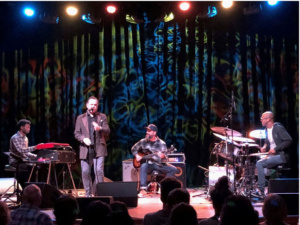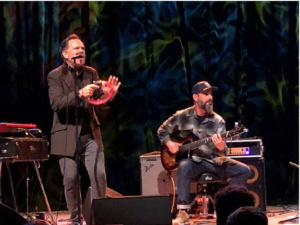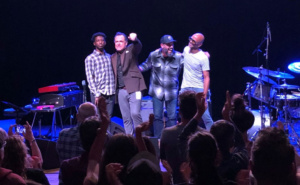Concert Review: Kurt Elling/Charlie Hunter Superblue
Both Kurt Elling and Charlie Hunter have been at the leading edge of jazz and jazz-adjacent music for about 30 years now. They’ve consistently shown unrelenting creativity, searching for new sounds and innovative concepts. They’ve collaborated off and on for over 20 years. An early notable joint effort appeared on two tracks on Hunter’s Songs From the Analog Playground (Blue Note, 2001). But it wasn’t until COVID that the two got serious about becoming a band.
Sunday night at the Boulder Theater, Elling talked about his seemingly constant touring (“I’m on a 30-year tour”) and then his frustration with the COVID lockdown. It was during that time that his friend Hunter recorded some music, passed the recordings around to some of his friends who added additional parts and then sent the package to Elling so he could add vocals. “But there are no words, no melodies for me to sing,” said Elling. “Right,” said Hunter, “that’s where you come in.” And thus, Superblue was born.
 Since his major label debut album, Close Your Eyes (Blue Note, 1995), Elling has styled himself as a jazz hep cat, throwing around jive like “hipposphere,” “indelible groove-itude” and rapping about the “way-out-o-sphere.” He’s covered many jazz standards and more recent pop and rock tunes always with a unique twist, but still grounded in jazz.
Since his major label debut album, Close Your Eyes (Blue Note, 1995), Elling has styled himself as a jazz hep cat, throwing around jive like “hipposphere,” “indelible groove-itude” and rapping about the “way-out-o-sphere.” He’s covered many jazz standards and more recent pop and rock tunes always with a unique twist, but still grounded in jazz.
Hunter’s recording debut was the album Charlie Hunter Trio (Prawn Song, 1993) and coincidentally, his major label debut was the same year as Elling’s and on the same label, Bing, Bing, Bing (Blue Note, 1995). From the beginning, Hunter has been constantly proving his indelible groove-itude by consistently laying down infectious beats. Compared to Elling, Hunter has been more on the rock/funk side than in the bebop camp where Elling has found his primary inspiration.
When it came time to introduce Hunter, Elling referred to him as “these two guys.” That’s because, from the beginning, Hunter has played both lead guitar and bass simultaneously. He started with an eight-string guitar, then a seven-string guitar and he’s now down to a mere six strings. He plays bass notes with the lower strings and plays lead lines and chords with the upper strings. To add to the complications, or perhaps eccentricities, the frets on the guitar neck are fanned rather than parallel.
 The Superblue concept brings Elling closer to Hunter’s sound than vice versa. Sunday night, the groove ruled. It was actually not much of a leap for Elling. He’s traveled far and wide musically and a few sojourns in funkville have been part of his past itinerary. And Superblue doesn’t completely turn its back on Bebop or the hep cats of yesteryear. The second song of the set was “Dharma Bums,” a title lifted from a Jack Kerouac novel, Kerouac, of course, being a leading voice of the Beat generation for whom bebop was as important as the open road and a full tank of gas.
The Superblue concept brings Elling closer to Hunter’s sound than vice versa. Sunday night, the groove ruled. It was actually not much of a leap for Elling. He’s traveled far and wide musically and a few sojourns in funkville have been part of his past itinerary. And Superblue doesn’t completely turn its back on Bebop or the hep cats of yesteryear. The second song of the set was “Dharma Bums,” a title lifted from a Jack Kerouac novel, Kerouac, of course, being a leading voice of the Beat generation for whom bebop was as important as the open road and a full tank of gas.
Another popular accoutrement of the bebop era was scat singing which has been a significant element of Elling’s music over the years. Sunday night, Elling had no intention of leaving one of his favorite devices behind. Instead, he proved scatting has, by no means, been left in the 20th Century. He even organized a scat-along with different segments of the audience scatting in harmony. Some of his scatting mimicked a conversation and tended to sound like the parents in a Charlie Brown cartoon. In a good way!
Earlier this year Superblue released its second album, The Iridescent Spree (Edition Records, 2023). The new album is a follow up to the band’s debut album, Superblue (Edition Records, 2021). The albums featured drummer Corey Fonville and bassist-keyboardist DJ Harrison. On tour Sunday night, those two were replaced by Julius Rodriguez on keyboards and Marcus Finnie on drums. Despite having a new record, the setlist was drawn mostly from the first album; five tunes from that release and only one from the new album.
The band played some originals penned by one or more band members as well as some covers. One of those covers appeared as the encore, “Lonely Avenue,” a tune written by Doc Pomus and covered by, among others, Ray Charles who had a big hit with it in 1956. A soul/blues hit from the 1950s stood in contrast to the edgy-funky-groove-oriented music of much of the set, but it turned out to be a delightful surprise and a crowd-pleaser.
Another cover, and the only entry from The Iridescent Spree, was written by Bob Dorough, a bebop veteran. But the song the band chose was not one of Dorough’s jazz standards from that era but from a different part of his career. The song “Naughty Number Nine” was one of many tunes Dorough composed for Schoolhouse Rock! The song is a musical multiplication table with some embellishments and observations on how the number nine fits into that whole crazy arithmetic scene. That particular song choice was perhaps driven by a desire to relate to the generation that grew up on Schoolhouse Rock! Because, you know, the jazz industry must work to appeal to younger listeners otherwise, the music will die out along with its older fans.
Speaking of fans, the age of Boulder Theater crowd was widely disbursed, from high school kids to those who had been collecting social security for a decade or two. It was also a responsive and expressive crowd, attentive to the action on stage and all its nuances and regularly hooting and hollering its approval of the proceedings. The dying embers of jazz? Not Sunday night at the Boulder Theater where jazz was alive and well.

Set List
Sassy
Dharma Bums
Stickin’ to My Guns
Naughty Number Nine
Hunter solo
Manic Panic Epiphanic
Endless Lawns
The Seed
Encore
Lonely Avenue
The Band
Kurt Elling, vocals
Charlie Hunter, 6 string guitar
Julius Rodriguez, keyboards
Marcus Finnie, drums
Kurt Elling/Charlie Hunter Superblue
Boulder Theater – October 8, 2023
By Geoff Anderson
Stay connected to KUVO’s programs and our community! Sign up for the Oasis E-News today!
Become a Member
Join the growing family of people who believe that music is essential to our community. Your donation supports the work we do, the programs you count on, and the events you enjoy.
Download the App
Download KUVO's FREE app today! The KUVO Public Radio App allows you to take KUVO's music and news with you anywhere, anytime!
